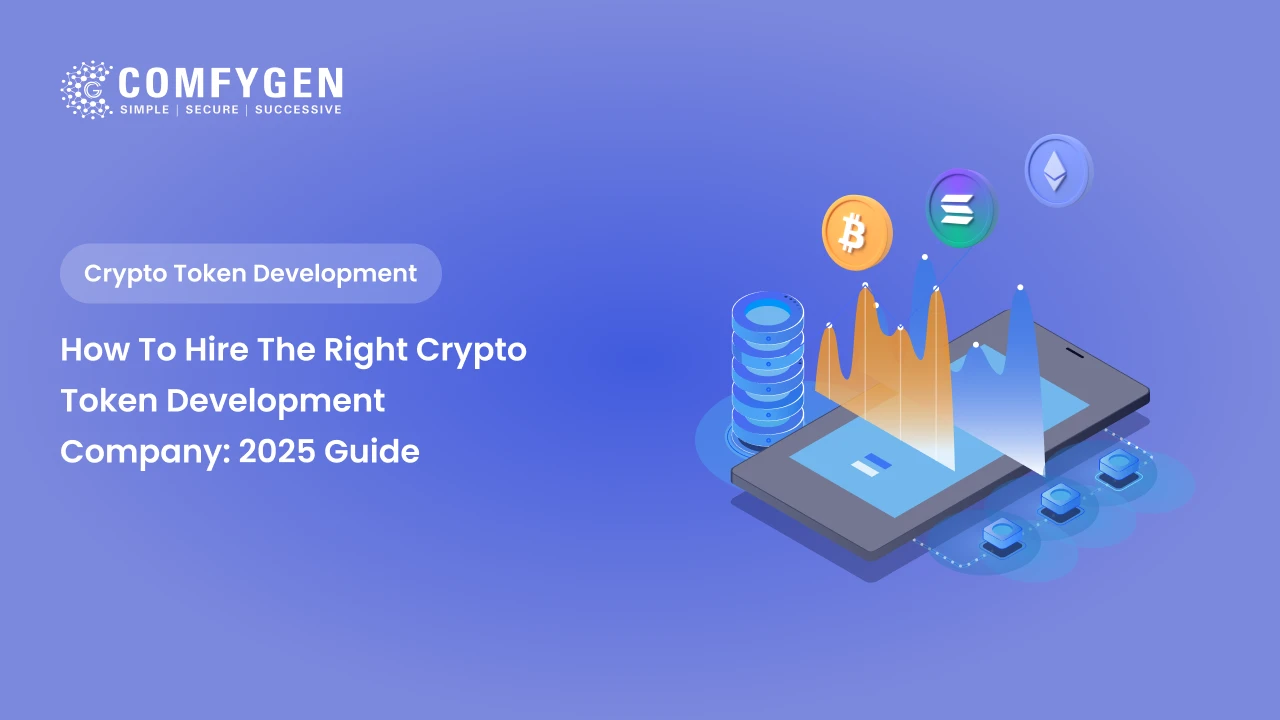Cryptocurrency Exchange Development: A Complete Guide

Cryptocurrency exchanges have revolutionized how we trade digital assets, providing a platform for buyers and sellers to easily transact. As the popularity of cryptocurrencies continues to rise, developing a robust and secure crypto exchange has become a lucrative business opportunity.
If you’re considering diving into cryptocurrency exchange development, this guide is for you. We’ll cover everything from statistics on the crypto exchange market to the nitty-gritty of building your own platform.
Statistics on The Crypto Exchange Industry
Here are some amazing statistics about cryptocurrency exchanges.
- Approximately 1,902.5 million USD will be spent on cryptocurrency in 2028, up from 910.3 million USD in 2021.
- Moreover, the tenfold increase in digital coins in the last decade ensures that cryptocurrency has now become mainstream. The number of cryptocurrencies will increase from a few in 2013 to over 10,000 in 2022.
- A report by markets and markets predicts a 7.1% CAGR for the cryptocurrency market from $1.6 billion in 2021 to $2.2 billion in 2026.
- marketsandmarkets estimates that the cryptocurrency market will reach USD 2.2 billion by 2022, growing at a CAGR of 7.1%.
What is A Crypto Exchange?
Cryptocurrency exchanges allow their customers to instantly buy and sell cryptocurrencies.
Cryptocurrency exchange platforms allow users to trade one cryptocurrency for another. A Binance coin can be purchased in exchange for Ethereum Blockchain or Litecoin.
Furthermore, customers can exchange their digital coins for conventional fiat money like US Dollars and Australian Dollars through crypto exchange apps.
Cryptocurrency exchange platforms also display the current market price of the cryptocurrencies they offer. It is possible to convert cryptocurrencies back into the currencies of the user’s choice. If they wish to trade back into crypto later, they can leave the amount as cash in their account or withdraw it in full.
The crypto exchange acts as an intermediary between buyers and sellers, earning revenue from transaction fees and commissions. There are transaction fees associated with withdrawals, trading, deposits, etc. As an added incentive, some crypto exchanges also issue tokens.
Types of Crypto Exchanges
-
Centralized Exchanges (CEX)
Centralized exchanges are managed by a single entity responsible for facilitating trading, ensuring liquidity, and maintaining security. They offer high transaction speeds, advanced trading features, and user-friendly interfaces, making them popular among both novice and experienced traders. However, users must trust the platform with their funds, as the exchange holds custody of the assets. This centralization can be a security risk if the platform is hacked, but it also allows for better customer support and regulation compliance.
-
Decentralized Exchanges (DEX)
Decentralized exchanges operate without a central authority, enabling peer-to-peer trading directly between users. These platforms offer enhanced privacy and security, as users retain control over their funds throughout the transaction process. Unlike centralized exchanges, DEXs do not require users to trust a central entity, reducing the risk of hacks and fraud. However, Decentralized exchanges often face challenges such as lower liquidity and slower transaction speeds, which can impact the overall trading experience and price efficiency.
Also Read: What is a DEX? How do Decentralized Exchanges Work?
-
Hybrid Exchanges
Hybrid exchanges aim to integrate the best features of both centralized and decentralized exchanges. They provide improved security and control over funds, akin to decentralized exchanges while maintaining the high liquidity and fast transaction speeds typical of centralized exchanges. Users can benefit from enhanced privacy and reduced reliance on a single entity without sacrificing the trading experience and advanced features. This dual approach seeks to address the limitations of both CEX and DEX, offering a balanced trading environment.
-
Instant Exchanges
Instant exchanges allow users to quickly swap one cryptocurrency for another without the need for an account or detailed verification processes. These platforms are designed for convenience, enabling fast and straightforward trades, often within minutes. While they are ideal for quick conversions and small trades, instant exchanges may charge higher fees compared to traditional exchanges. They prioritize speed and ease of use over extensive trading features, making them suitable for users looking for quick, hassle-free transactions.
-
Peer-to-Peer Exchanges (P2P)
Peer-to-peer (P2P) exchanges connect buyers and sellers directly, facilitating trades without intermediaries. These platforms enhance privacy and control, as transactions occur directly between users. P2P exchanges rely on user ratings, feedback systems, and escrow services to build trust and ensure security. While they offer greater autonomy and often lower fees, the trade process can be slower, and the reliance on user trust mechanisms can pose risks if not managed properly. P2P exchanges are ideal for users prioritizing privacy and direct transactions.
Key Components of a Cryptocurrency Exchange
-
Trading Engine
The trading engine is the core component of any cryptocurrency exchange, responsible for matching buy and sell orders. It ensures that transactions are executed efficiently and accurately. An effective trading engine must be highly efficient, scalable, and capable of handling high volumes of transactions simultaneously. Its performance directly impacts the exchange’s ability to provide a seamless trading experience, manage market liquidity, and maintain competitive speed in executing trades.
-
User Interface (UI)
A user-friendly interface is important for attracting and retaining users on a cryptocurrency exchange. The UI design should be intuitive, allowing users to navigate the platform easily, execute trades, and access information quickly. It must be responsive and accessible across various devices, including desktops, tablets, and smartphones. A well-designed UI enhances the user experience by making complex trading operations straightforward and ensuring that even beginners can trade with ease.
-
Wallet Integration
Integrated wallets are important for the secure storage, deposit, and withdrawal of cryptocurrencies. These wallets must support multiple currencies and employ strong encryption to protect user funds. A crypto wallet development ensures that users can manage their assets conveniently within the exchange. It also involves seamless synchronization with the trading engine and UI, providing a cohesive and secure environment for managing digital assets.
Also Read: The Complete Guide to Developing a Multicurrency Wallet
-
Admin Console
The admin console is a backend toolset that allows exchange operators to manage the platform effectively. It includes functionalities for overseeing user accounts, monitoring transactions, and configuring system settings. A robust admin console enables administrators to enforce security protocols, manage liquidity, handle customer support, and ensure regulatory compliance. This component is critical for maintaining the overall health and operational efficiency of the cryptocurrency exchange.
-
Security Features
Security is paramount in cryptocurrency exchange development services to protect user funds and data. Essential security features include encryption to safeguard data transmission, multi-signature wallets to enhance fund security, and cold storage solutions to store the majority of assets offline. Additionally, DDoS protection prevents attacks that could disrupt service availability. Implementing these security measures helps build trust with users by ensuring that their assets and personal information are well-protected.
Also Read: What is SPL Token? How is it Better From Solana Token?
Step-by-Step Processes of Crypto Exchange
-
Select Operational Countries
Identify which countries to operate in by evaluating their regulatory environment and market potential. Consider regions with favorable cryptocurrency laws and high demand for digital currencies. Research local regulations thoroughly to avoid legal issues and assess the competitive landscape to determine the feasibility of entering the market. A strategic choice of operational countries can significantly influence the success of your crypto exchange by ensuring legal compliance and tapping into lucrative markets.
-
Identify Your Target Audience
Define your target audience by understanding their demographics, preferences, and behaviors. Analyze potential user segments such as individual traders, institutional investors, or specific demographic groups. Tailor your platform’s features, interface, and marketing strategies to meet their unique needs. Understanding your audience helps in creating a user-centric platform that resonates with users, enhancing engagement and loyalty, ultimately leading to a more successful and user-friendly crypto exchange.
-
Comply with Legal Requirements & Obtain Licenses
Ensure your exchange complies with the regulatory requirements of each country you operate in. Obtain all necessary licenses and certifications to operate legally. This involves understanding and adhering to local financial regulations, anti-money laundering (AML) laws, and know your customer (KYC) requirements. Legal compliance is critical to building trust with users and authorities, preventing legal issues, and establishing a reputable and sustainable operation in the cryptocurrency market.
-
Define Cryptocurrency Exchange Features
Outline the key features your exchange will offer based on comprehensive market research and user needs. Common features include user-friendly trading interfaces, diverse cryptocurrency options, advanced trading tools, and robust security measures. Additional features like mobile compatibility, multilingual support, and customer support can enhance user experience. Clearly defining these features helps in creating a detailed development plan, ensuring that the final product meets user expectations and market demands.
-
Partner with a Crypto Exchange Development Company
Choose a reputable cryptocurrency exchange development company with proven experience in building secure and scalable cryptocurrency exchanges. Evaluate potential partners based on their technical expertise, portfolio, client reviews, and security practices. A strong partnership with a capable crypto development firm in India ensures the exchange is built with high standards of security, functionality, and performance, laying a solid foundation for its success and reliability in the competitive cryptocurrency market.
-
Design a User-Friendly Platform
Collaborate with experienced designers to create an intuitive and visually appealing interface for your cryptocurrency exchange. Focus on ease of navigation, accessibility, and a seamless user experience. Incorporate feedback from potential users to refine the design.
A well-designed platform enhances user satisfaction, making it easier for users to trade and manage their assets, thereby increasing user retention and attracting a broader audience.
-
Develop the Cryptocurrency Exchange
Follow a structured development process that includes coding, rigorous testing, and debugging. Utilize agile development methodologies to ensure flexibility and continuous improvement. Focus on building a secure, scalable, and efficient platform. Regularly review and update the development progress, incorporating user feedback and industry best practices. Proper practices are important for creating a reliable, high-performance cryptocurrency exchange development.
-
Implement Security Measures
Integrate robust security measures to protect user funds and sensitive data. This includes multi-factor authentication, encryption, secure API connections, and regular security audits. Employ best practices for cybersecurity, such as implementing cold storage for cryptocurrencies and conducting penetration testing.
Ensuring high levels of security helps build user trust and safeguards the platform from hacking attempts and fraud, which are critical for maintaining the integrity of your exchange.
-
Test Your Platform Thoroughly
Conduct extensive testing to ensure the platform operates correctly and securely. This process includes functional testing, performance testing, security testing, and user acceptance testing. Simulate various scenarios to identify and fix potential issues before launch.
Thorough testing helps in identifying bugs, vulnerabilities, and usability problems, ensuring a smooth and reliable user experience. A rigorously tested platform minimizes the risk of post-launch issues and builds user confidence.
-
Launch & Promote Your Exchange
Launch your exchange with a comprehensive marketing strategy aimed at attracting users and building a strong user base. Utilize various marketing channels such as social media, content marketing, influencer partnerships, and PR campaigns. Offer promotions and incentives to encourage user registration and trading activity.
Effective marketing helps in creating awareness, drive traffic, and establishing your exchange in the competitive cryptocurrency market. Continuous promotion and user engagement strategies are vital for sustained growth and success.
Hire Crypto Exchange Developers For Your Project!
Crypto Exchange App Features You Need to Know
-
User Registration and Authentication
A seamless and secure registration process is vital for attracting new users to a cryptocurrency exchange. This involves straightforward sign-up procedures combined with robust authentication measures, such as two-factor authentication (2FA). These security protocols protect user accounts from unauthorized access and ensure that only verified individuals can trade on the platform, thereby enhancing overall security and user trust.
-
Deposit and Withdrawal Management
Efficient management of deposits and withdrawals is crucial for user satisfaction. Automated systems for handling these processes can significantly enhance speed and accuracy, reducing wait times and errors. This functionality ensures that users can quickly and securely move funds in and out of the exchange, maintaining a smooth trading experience and encouraging continued use of the platform.
-
Order Book and Matching Engine
An accurate order book and efficient matching engine are essential components for ensuring that trades are executed correctly and promptly. The order book records all buy and sell orders, while the matching engine pairs compatible orders to facilitate transactions. This ensures market integrity, fair pricing, and a smooth trading experience, which are crucial for attracting and retaining traders.
-
Liquidity Management
Maintaining adequate liquidity is essential for smooth and efficient trading. This can be achieved through strategic partnerships, engaging market makers, and creating liquidity pools. High liquidity ensures that users can execute large trades without significant price slippage, providing a better trading experience and enhancing the exchange’s reputation.
-
KYC and AML Compliance
Compliance with Know Your Customer (KYC) and Anti-Money Laundering (AML) regulations is mandatory to prevent fraud, money laundering, and other illegal activities. Implementing these measures involves verifying user identities and monitoring transactions for suspicious activity. Compliance not only protects the exchange from legal issues but also builds trust with users and regulators.
-
Multi-currency Support
Supporting multiple cryptocurrencies attracts a broader user base and increases trading volume. Multi-currency support allows users to trade a variety of digital assets on a single platform, enhancing their trading experience and encouraging diverse trading activities. It also positions the exchange as a versatile and comprehensive marketplace for digital assets.
-
Transaction History and Reporting
Providing detailed transaction histories and reporting features helps users track their trading activities and ensures transparency. Users can review their past trades, deposits, withdrawals, and account balances, which aids in financial planning and record-keeping. Transparency in transaction history builds trust and allows users to verify their activities and the exchange’s integrity.
-
API for Trading Bots
Offering an API (Application Programming Interface) allows users to connect trading bots to the exchange, enhancing trading efficiency and attracting professional traders. APIs enable automated trading strategies, which can operate 24/7, optimize trading opportunities, and execute trades based on predefined criteria, providing a significant advantage to active and algorithmic traders.
-
Customer Support
Reliable customer support is crucial for resolving user issues, answering questions, and maintaining trust. Effective customer support includes multiple communication channels, such as live chat, email, and phone support, and ensures timely and knowledgeable assistance. Good customer support helps retain users, builds a positive reputation, and addresses concerns promptly, enhancing the overall user experience.
Also Read: How to Choose the Right Altcoin Development Company?
The Business Benefits Of Starting A Crypto Exchange
Cryptocurrency exchanges have the following specific business benefits:
-
Costs of Crypto Exchange development were reduced
Cryptocurrency exchanges attract customers due to their low development costs. When compared to other businesses today, these platforms will not require millions of dollars to launch.
-
Success Chances Increased
Digital currencies have become very profitable investments due to recent high profits made by investors. A cryptocurrency exchange development will have a greater chance of success if the cryptocurrency craze continues.
-
Business Model for the Future
The White Label Crypto Exchange Software development is one of the ten most lucrative business models for the future. The business is excellent and will be profitable for a long time to come. By entering this market, not only will you be able to secure a better future, but you will also be able to make more money.
-
Effortlessly profitable in all aspects
Cryptocurrency exchanges and Cryptocurrency Development companies in India will remain unaffected if the market falls. Their transactions are heavily dependent on commissions, which charge fees for both buying and selling. A falling market leads to people selling their possessions. In times of rising markets, they buy. It is always guaranteed that the platforms will make money in each scenario.
-
Timely development of Crypto Exchange
A Cryptocurrency Development Company in India, can greatly assist you and reduce the amount of time it takes to develop your cryptocurrency exchange. In order to complete the project on time, we possess the necessary expertise.
Security Measures for Crypto Exchanges
Ensuring the security of cryptocurrency exchanges is paramount to protect user funds and maintain trust. Here are essential security measures employed by exchanges:
-
Encryption Techniques
Utilizing robust encryption methods safeguards sensitive user data and transaction information, preventing unauthorized access by encrypting data both at rest and in transit.
-
Multi-Signature Wallets
Multi-signature wallets require multiple private keys to authorize transactions, providing an extra layer of security. This reduces the risk of unauthorized access and prevents single points of failure.
-
Cold Storage
Storing the majority of funds in offline, secure environments, known as cold storage, protects them from online threats such as hacking and cyberattacks. By keeping assets offline, exchanges mitigate the risk of theft or loss due to security breaches.
-
DDoS Protection
Distributed Denial of Service (DDoS) attacks can disrupt exchange operations by flooding servers with excessive traffic. Implementing DDoS protection measures helps mitigate the impact of such attacks, ensuring the exchange remains accessible to users.
-
Regular Security Audits
Conducting regular security audits is essential to identify vulnerabilities and ensure that the exchange’s security measures remain effective and up-to-date. Independent audits by security professionals help identify weaknesses and areas for improvement, enhancing overall security posture.
Read More: The Types of Crypto Tokens
How Much Does Crypto Exchange Development Cost?
The cost of developing a cryptocurrency exchange varies significantly based on factors like the complexity of features, the development team’s expertise, and the requirements for regulatory compliance. Generally, development costs can range from $100,000 to $500,000 or more. This estimate includes expenses related to design, development, testing, and initial security measures.
Additionally, it’s essential to budget for ongoing maintenance, regular security updates, and continuous marketing efforts to ensure the platform’s success and longevity. Careful financial planning and investment in quality development are crucial for creating a competitive and secure cryptocurrency exchange.
Conclusion
Cryptocurrency exchange development is a complex but rewarding endeavor. By understanding the market, choosing the right type of crypto exchange, incorporating essential features, and implementing robust security measures, you can create a successful platform. This guide provides a comprehensive roadmap to help you navigate the process and achieve your goals in the dynamic world of cryptocurrency trading.
Quick Contact Us:
Call/WhatsApp: +91 958-786-7258
Telegram: @comfygen
Email: [email protected]
FAQs
What are the key differences between Centralized (CEX) and Decentralized Exchanges (DEX)?
Centralized Exchanges (CEX): Managed by a single entity, CEXs offer high transaction speeds and user-friendly interfaces but require users to trust the platform with their funds. They typically provide greater liquidity and customer support.
Decentralized Exchanges (DEX): Operate without a central authority, allowing users to trade directly with each other. DEXs offer enhanced privacy and security since users retain control over their funds, but they may have lower liquidity and slower transaction speeds compared to CEXs.
How do cryptocurrency exchanges ensure the security of user funds?
Cryptocurrency exchanges implement multiple security measures to protect user funds, including:
- Encryption Techniques: Protecting sensitive data and transaction information from unauthorized access.
- Multi-Signature Wallets: Requiring multiple keys to authorize transactions, adding an extra layer of security.
- Cold Storage: Storing the majority of funds in offline, secure environments to safeguard against online threats.
- DDoS Protection: Preventing Distributed Denial of Service attacks that could disrupt operations.
- Regular Security Audits: Conducting periodic audits to identify and rectify vulnerabilities.
What are the essential features a cryptocurrency exchange should have?
A well-rounded cryptocurrency exchange should include:
- User Registration and Authentication: Easy sign-up processes with robust authentication measures.
- Deposit and Withdrawal Management: Efficient handling of deposits and withdrawals to ensure smooth transactions.
- Order Book and Matching Engine: Accurate order matching for prompt trade execution.
- Liquidity Management: Maintaining liquidity through various strategies to ensure smooth trading.
- KYC and AML Compliance: Ensuring compliance with regulations to prevent fraud and legal issues.
- Multi-currency Support: Supporting various cryptocurrencies to attract a broader user base.
- Transaction History and Reporting: Providing detailed records for transparency and user tracking.
- API for Trading Bots: Enabling integration with trading bots to enhance trading efficiency.
- Customer Support: Offering reliable support to resolve user issues and maintain trust.
How much does it cost to develop a cryptocurrency exchange?
The cost of developing a cryptocurrency exchange can vary widely based on several factors, including the complexity of features, the experience of the development team, and regulatory compliance needs. On average, the development cost can range from $100,000 to $500,000 or more. It's important to also budget for ongoing maintenance, security updates, and marketing efforts to ensure the platform's success and longevity.

Mr. Saddam Husen, (CTO)
Mr. Saddam Husen, CTO at Comfygen, is a renowned Blockchain expert and IT consultant with extensive experience in blockchain development, crypto wallets, DeFi, ICOs, and smart contracts. Passionate about digital transformation, he helps businesses harness blockchain technology’s potential, driving innovation and enhancing IT infrastructure for global success.
Based on Interest

Blockchain Consulting Services: Transforming Your Business with Cutting-Edge Blockchain Solutions
Introduction Blockchain technology is revolutionizing industries by providing secure, decentralized, and transparent solutions. As businesses across the world explore their potential,…









